Filipino superstitions
One thing to know about the Philippines is that Filipinos are deep into folklore. Centuries-old beliefs are passed down from generation to generation that they seamlessly intertwine with life even until today.
From whispered cautions to amusing jokes, the country is brimming with a tapestry of superstitions that bring out a sense of curiosity in us. If you want to find out more, then take a seat. Here are 22 Filipino superstitions that have shaped Filipino lives from the past to the present.
Table of Contents
- Filipino superstitions
- 1. Taking off a friend’s ring breaks friendship
- 2. Dreams are harbingers of truth
- 3. Slippers by the door ward off unwelcome spirits
- 4. Using agimat, anting-anting, and gayuma for protection & more
- 5. Usog or bati to maintain a child’s wellbeing
- 6. Borrowing salt at night summons unwanted spirits
- 7. Planting trees near your home to bring in good luck
- 8. Raining while the sun is out signifies mythical creatures
- 9. Oomancy and divination practices for healing
- 10. Sweeping at night sweeps away good luck
- 11. Having itchy palms foretells money matters
- 12. Whistling at night attracts spirits
- 13. Opening umbrellas indoors attract misfortune
- 14. Hanging up rosaries and garlic to protect from evil
- 15. Offering food to spirits to keep them out of your home
- 16. Putting money in shoes for wealth
- 17. Trimming nails at night will cause accidents
- 18. Turning your plate when someone leaves the table to ensure safety
- 19. “Tao po” to stay safe from mythical creatures
- 20. Sukob between siblings for undivided luck
- 21. Respecting elementals is a must
- 22. Suddenly missing things because of dwarves
- Filipino superstitions in everyday life
1. Taking off a friend’s ring breaks friendship

Image credit: Lexie Jordan Jewelry
Wearing a ring can be a form of self-expression. You wear rings either because they go with your style or that you value a loved one’s thoughtful gift.
But in Filipino culture, elders would have us believe that we should be careful when we’re with friends. If at any point that a friend notices the ring you’re wearing, don’t let them remove it from your finger. Once you let it happen, belief entails that your friendship with the person, who removed your ring, will be broken.
Over time, this superstition has evolved into something more simple. Some people believe that taking off a friend’s ring will lead to a fight or an argument instead of the friendship breaking up completely.
2. Dreams are harbingers of truth
 Image credit: Annie Spratt via Unsplash
Image credit: Annie Spratt via Unsplash
Everybody has dreams all the time. It’s not an uncommon thing at all. However, according to elderly Filipino superstitions, dreams are more than just fleeting images of the night. They’re glimpses of an ethereal realm where signs and symbols carry weight. Filipinos believe that there are certain dreams that could possibly unfold future events, prompting a mix of apprehension and anticipation.
For example, if you had a dream about someone losing teeth, it conveys a dark interpretation that someone you know might fall to their death. It can even go as far as knowing who it might be if you remembered the person who lost teeth in your dream. This is why elders advise that if you encounter this dream, you shouldn’t share it with other people and immediately pray for the person.
On the other hand, if you dream about a loved one who has passed away, it means that they’re looking after you from above.
3. Slippers by the door ward off unwelcome spirits
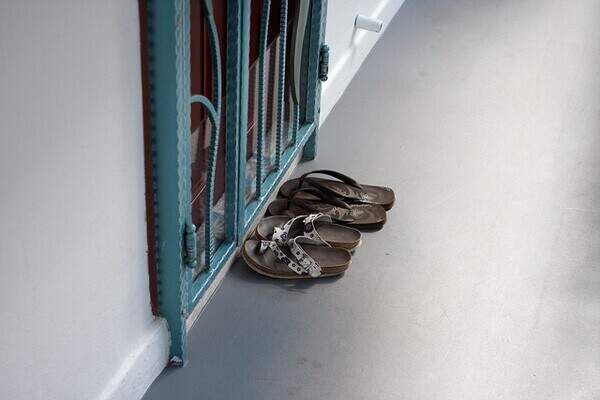
Image credit: KCET
When you visit an Asian household, you’re bound to notice the rows of shoes and slippers placed by the door. Practically speaking, this makes sense if you’re someone who likes to keep the floor clean inside the house.
While not all Filipinos practice this, there are some who believe that slippers act as guardians against unwelcome spirits. What you do is flip your slippers upside down and place them near the entrance so that they ward off malevolent entities seeking to infiltrate your home.
4. Using agimat, anting-anting, and gayuma for protection & more
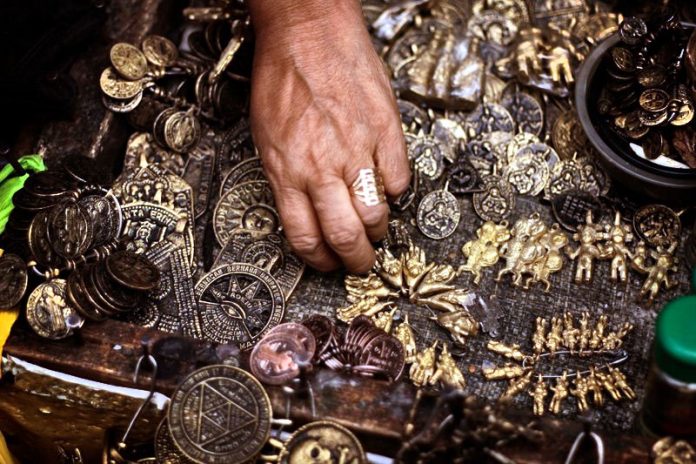
Image credit: The Aswang Project
Growing up, you may have seen your grandparents, and sometimes even babies, wearing odd-looking pendants. They’re either worn as a necklace or pinned on a baby’s clothing – to be explained below in the following item.
Well, these pendants don’t come as it is. Elders refer to them as agimat, an amulet or talisman that can protect you against evil forces. While wearing it as a necklace is the most common thing to do, some would tuck an agimat discreetly inside their pockets for protection.
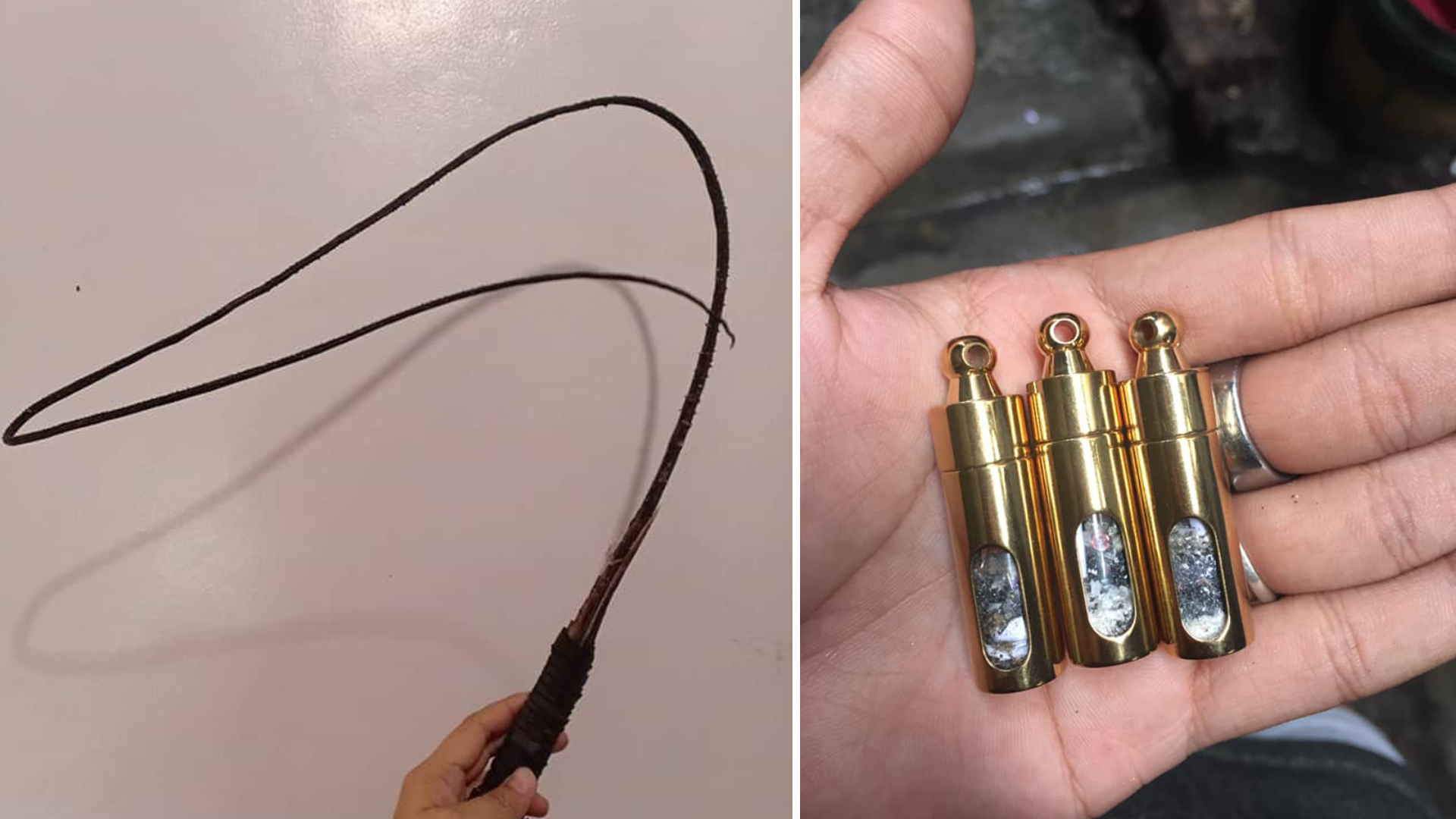
Image adapted from: tindahan_ni_cherry, Agimat antinganting vertud mutya at oracion pangkalahatan depensa via Facebook
Anting-anting, on the other hand, is similar to an agimat, but still entirely different. Yes, an anting-anting can give you protection like an agimat. What makes it different is that, according to elders, it has the ability to give you powers. While an agimat is basically a pendant with symbols, an anting-anting can be anything from a sting ray’s tail to a grain of crystal to even a bullet.
It’s believed that possessing an anting-anting can give you supernatural abilities such as commanding without force, invincibility, or even prolonging your life.
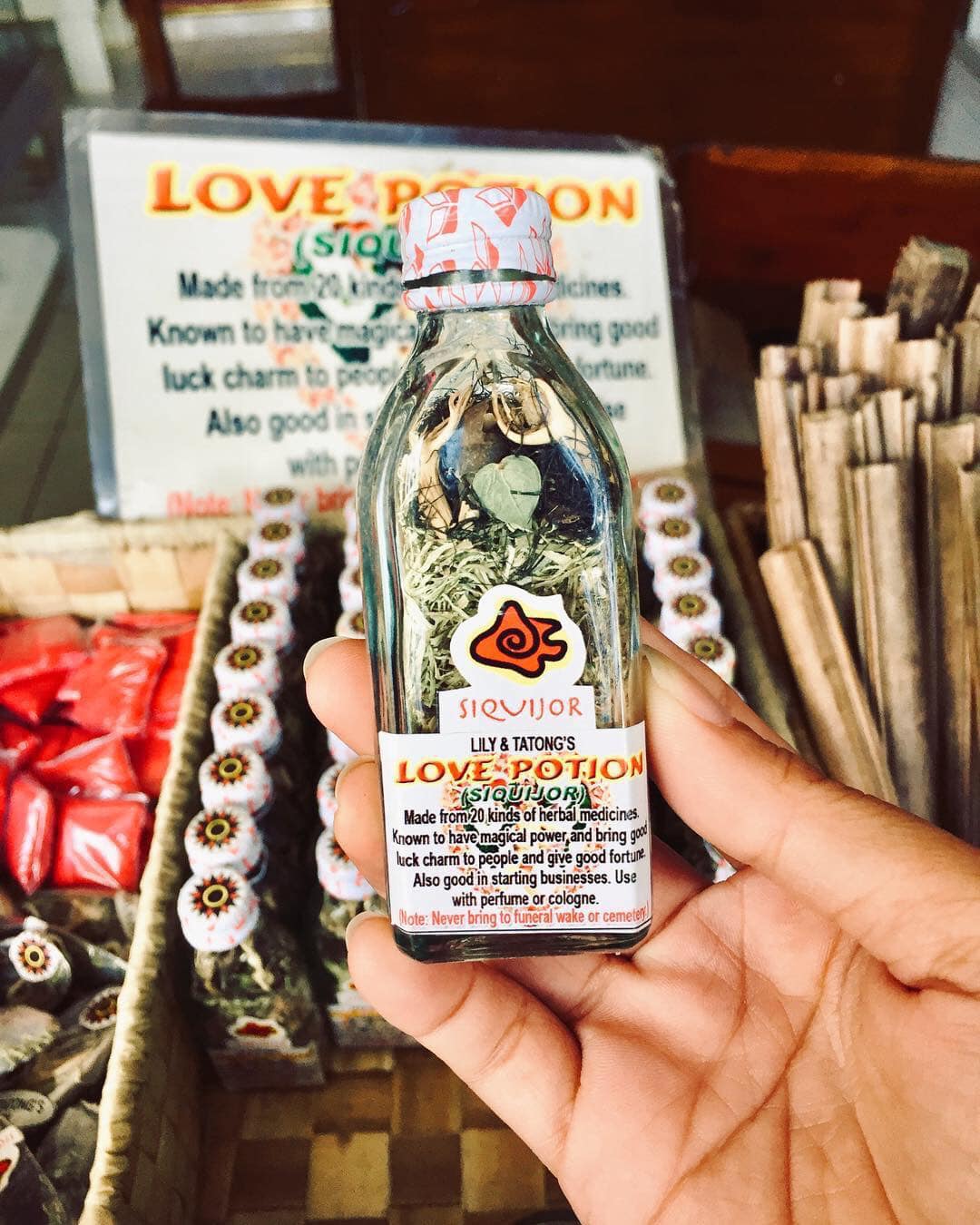
Image credit: Visayan Khronika via Facebook
Gayuma is another cultural belief that has a darker background as the help of a mangkukulam (witch) is needed. Gayuma is a potion that can get a person to do your bidding. In the olden days, women would resort to a gayuma to get a man of their choosing to fall in love with them. And that’s just a part of an entire ritual. Aside from the potion, the ritual involves what is referred to as “black magic” with incantations, needles, and voodoo dolls.
Even if it has been passed through generations, harnessing supernatural forces to influence love and fate is uncharted territory. For obvious reasons, and thankfully so, no one has practiced this since then.
However, just as a reminder, you must trust in elders when they say that participating in witchcraft is overall dangerous and can lead to serious consequences. You must never associate with it at any cost.
5. Usog or bati to maintain a child’s wellbeing

Image credit: StuartXchange
Related to the aforementioned belief, usog or bati is something that elders associate with young children, especially newborn infants. As Filipinos are known for being warm and hospitable, it’s only natural for them to give compliments when they see a cute baby. But no matter the intention, this display of adoration must be kept at bay as it can cause illness to the child.
Elders believe that people who greet the child bring about strong energies that can suddenly give discomfort to said child. If giving a compliment can’t be helped, it’s usually countered by saying “pwera usog” or “pwera bati” immediately right after. This is why you may hear adults saying this phrase when they see an adorable infant for the first time.
Parents would also counteract this either with an anting-anting pinned to the baby’s clothing or a dot of red lipstick on their forehead.
And if there comes a time that the child does experience unexplainable maladies, parents would deem their baby as “nausog” or “nabati”. As a cure, the parents would seek out the compliment giver and ask him or her to mark the baby’s forehead with their saliva.
Whether this superstition is true or not, parents prefer to stay on the safe side and just go with it to protect their child in every way possible.
6. Borrowing salt at night summons unwanted spirits

Image credit: Castorly Stock via Pexels
As a practical person, borrowing or asking for salt is just a simple request. Unfortunately, this, too, has a hidden belief for our Filipino elders. If you happen to do this at night, it’s possible that you’ll be summoning unwanted spirits into your home.
So if you plan on getting salt from your neighbor, make sure to do it during the day.
Other than that, spilling salt is also considered bad omen. The good thing is that you can easily counteract it by tossing a pinch of salt over your left shoulder.
7. Planting trees near your home to bring in good luck
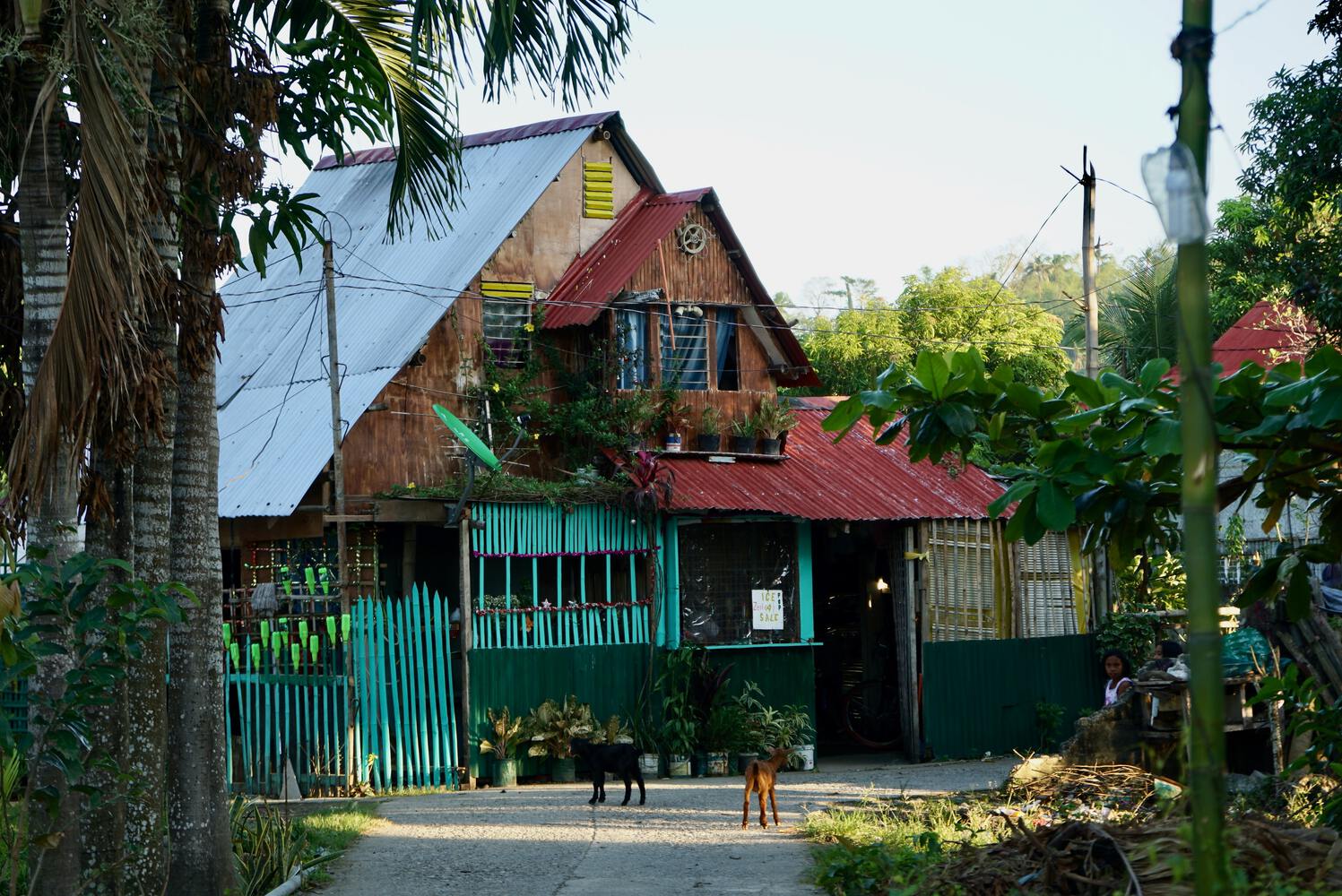 Image credit: Beth Macdonald via Unsplash
Image credit: Beth Macdonald via Unsplash
There are a number of superstitions made specifically for a house or home. For example, when you move houses, belief suggests that the first things to do is put salt and coins in the new home to ward off evil spirits. All the same, it’s also a way to drive any existing spirits away before you officially move in.
Interesting enough, another one of these superstitions advises that you must plant a tree near your home for overall prosperity. Doing this is thought to bring good luck and provide protection from negative energies.
Now, it isn’t said as to what type of tree to plant. Although, if you end up planting a fruit-bearing tree, then you’ll most likely live a smooth life in your new-found home.
8. Raining while the sun is out signifies mythical creatures

Image credit: Mackenzie Dailey via Pinterest
Raining while the sun is shining, a.k.a. sun showers, is not something that happens all the time. Not a lot of people get to see it, in fact. While there’s a scientific reason why it happens, Filipino elders have formed a superstitious belief for this rare phenomenon. And it involves mythological creatures.
Often put off as a joke, it is believed that when a sun shower occurs, it’s most likely that an aswang (shape-shifting creature) is giving birth. And depending on who you ask, one will also say that a tikbalang (a creature with a head of a horse and body of a human) couple is getting married.
Because a sun shower is deemed “weird”, people from around the world have their own interpretations, from foxes getting married to an unknown hole in the heavens. Clearly, the Philippines is not alone on this one.
9. Oomancy and divination practices for healing
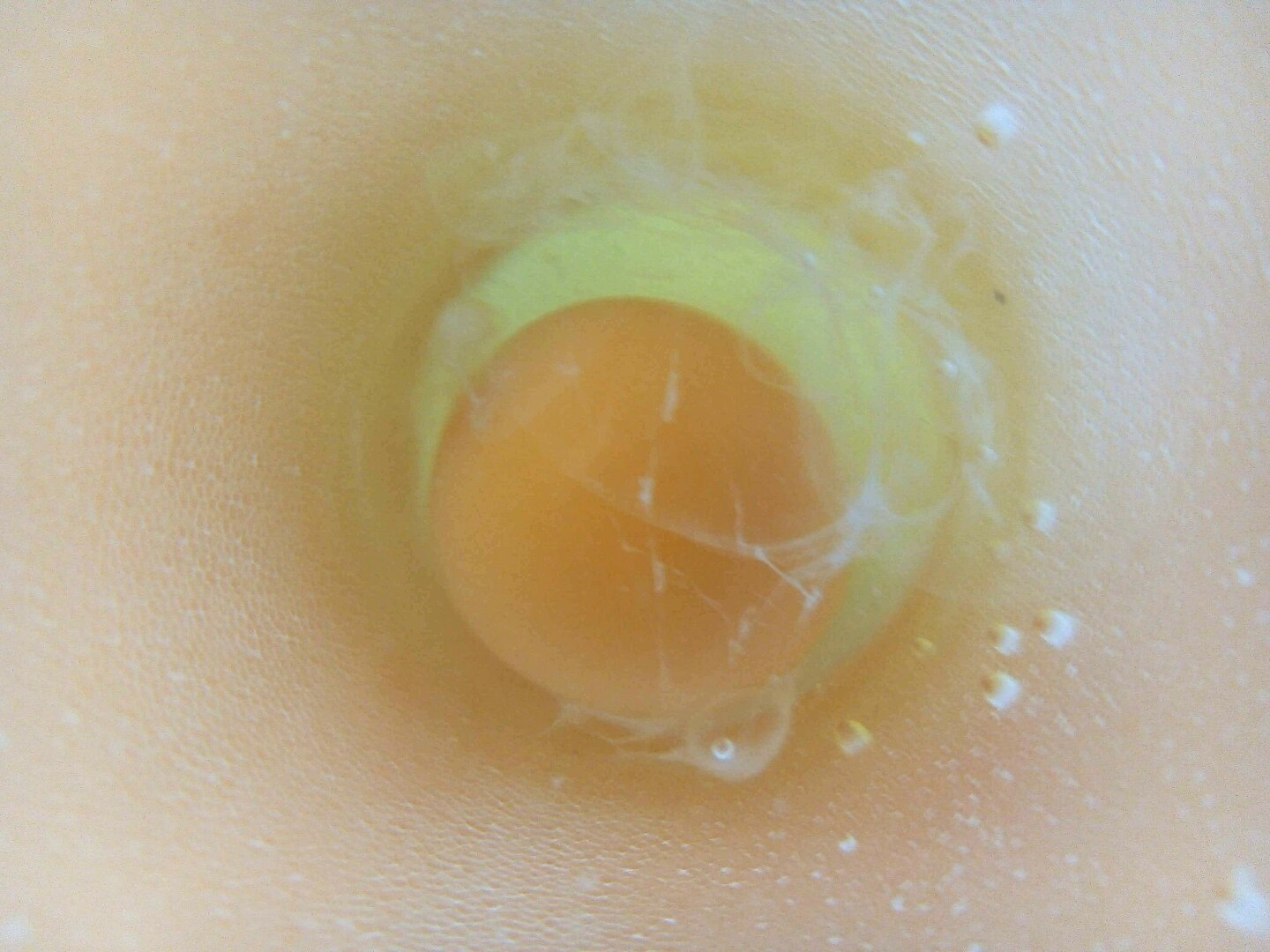
Image credit: Rollcloud via Wikipedia
For a time, it’s safe to assume that Filipino belief has revolved around spiritual practices for different purposes. Even now, there are some places, especially provinces, that have a local albularyo (folk healer or witch doctor) who people turn to for unexplainable instances happening from illnesses to exorcisms.
Oomancy or divination by eggs, is one way to determine the reason behind an illness. The healer will crack an egg open in a bowl or glass of water and the interpretations start there. The certain patterns formed by the egg whites supposedly hold the explanations whether it’s someone who gave the sick person an “evil eye” or because of something that happened previously.
Even more so, it can also be used to tell the future. It’s said that the way the egg “dances” in the water reveals a mystical tapestry of omens and possibilities.
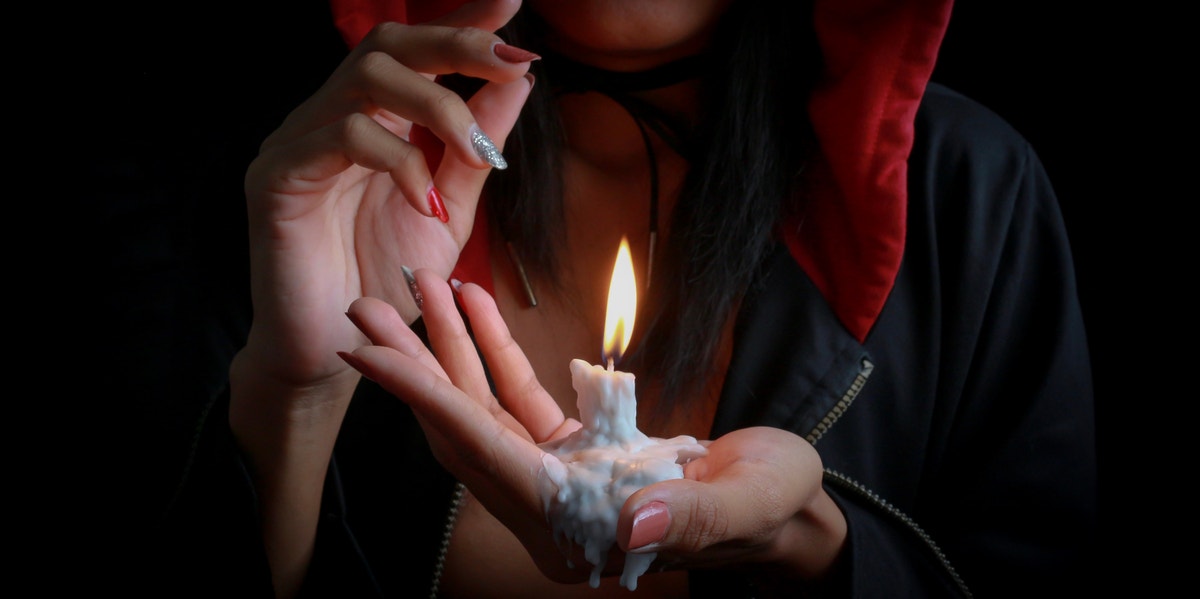
Image credit: YourTango
Aside from eggs, an albularyo also uses candles to aid their interpretation rituals. In this case, the melted wax is poured in the bowl of water. The interpretation is made once some kind of figure is formed in the water.
10. Sweeping at night sweeps away good luck
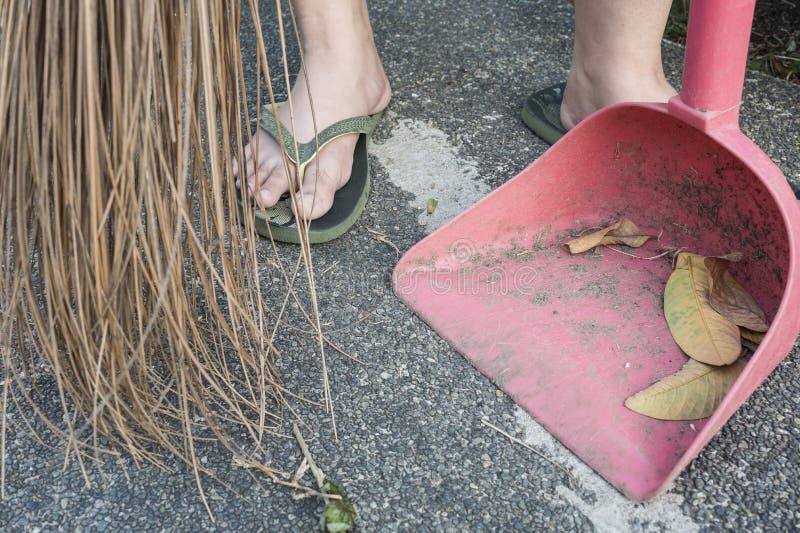
Image credit: Dreamstime
Sweeping at night is one of the most common superstitions in Filipino folklore. Sweeping is such a common thing for Filipinos that you’ll be seeing them doing it at any time of the day from morning, noon, and night.
Believe it or not, even this simple task is given a belief by the elders. If you sweep the house at night, belief says that you’ll be sweeping away good luck and inviting bad luck into the home. As a precautionary measure, it may be better to sweep during the daytime.
But because Filipinos have the tendency to be industrious, this superstition is often ignored or disregarded.
11. Having itchy palms foretells money matters

Image credit: Singjai20 via iStock
Like all working-class individuals, Filipinos strive for financial stability all the time. So if there’s anything they can do to achieve that, they’ll probably consider doing it, even if it’s a superstitious belief.
If your palm starts to itch, belief suggests that there’ll be wealth coming to you soon. And most Filipinos believe in the superstition so much that it became more specific over time. Depending on the palm, you could either be receiving or losing wealth. It is said that an itchy right palm indicates financial gain while an itchy left palm leads to you losing money.
For more effectivity, some even go a step further and slide the itchy palm in their pocket to manifest the incoming wealth.
12. Whistling at night attracts spirits
 Image credit: Kyla Worrell and Mya Worrell via Pacific Ties
Image credit: Kyla Worrell and Mya Worrell via Pacific Ties
Whistling at night is a superstition that Filipinos inherited from Chinese influence. Doing the very act can attract ghosts, wandering spirits, or other supernatural beings, which can end up following you home.
Even more so, over time, Filipinos have given their own interpretation of this superstition. According to Filipino belief, whistling in an indoor space either means that you’re doing it for the devil without knowledge or that you’re “whistling up a storm.” And if you do it at night, then you’ll be summoning evil spirits.
Superstitious Filipinos, till today, avoid whistling during the evening to prevent encountering unknown entities. Yes, it all sounds awfully dark, but it’s better to be safe than sorry, right?
13. Opening umbrellas indoors attract misfortune
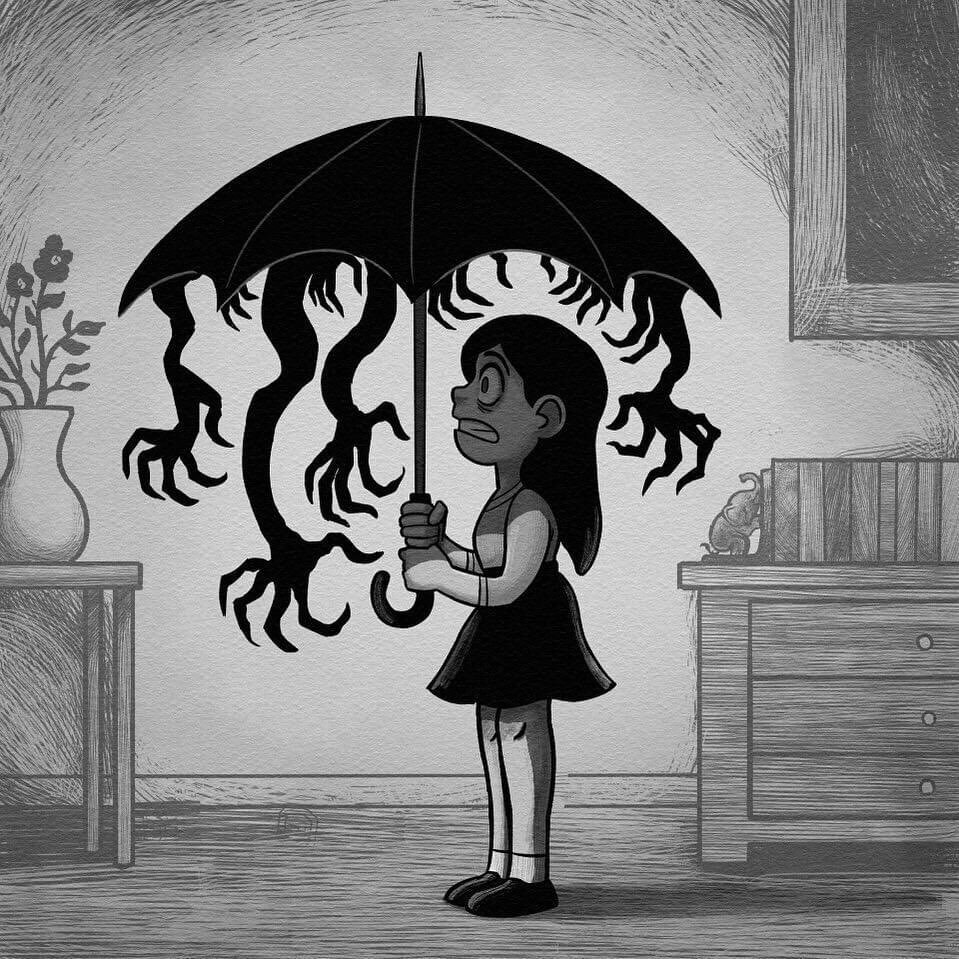
Image credit: @michaelramstead via Twitter
When it comes to umbrellas, it’s pretty much simple. You use them when it’s raining or when the sun is too hot. However, there are curiously stubborn ones, specifically kids, who try opening umbrellas while indoors.
Elderly belief explains that doing this will bring your household bad luck or misfortune as you’ll be shielding yourself from good luck coming to you. Additionally, it can potentially offend good spirits in the house.
Although this is the initial belief, many Filipinos now use this superstition to prevent young ones from breaking or damaging objects inside the house. Some adults won’t even use the superstition and just say “sige ka, may lalaglag na butiki diyan” (go ahead, a lizard will fall on you), and almost immediately, the kids will close the umbrella from fear.
14. Hanging up rosaries and garlic to protect from evil
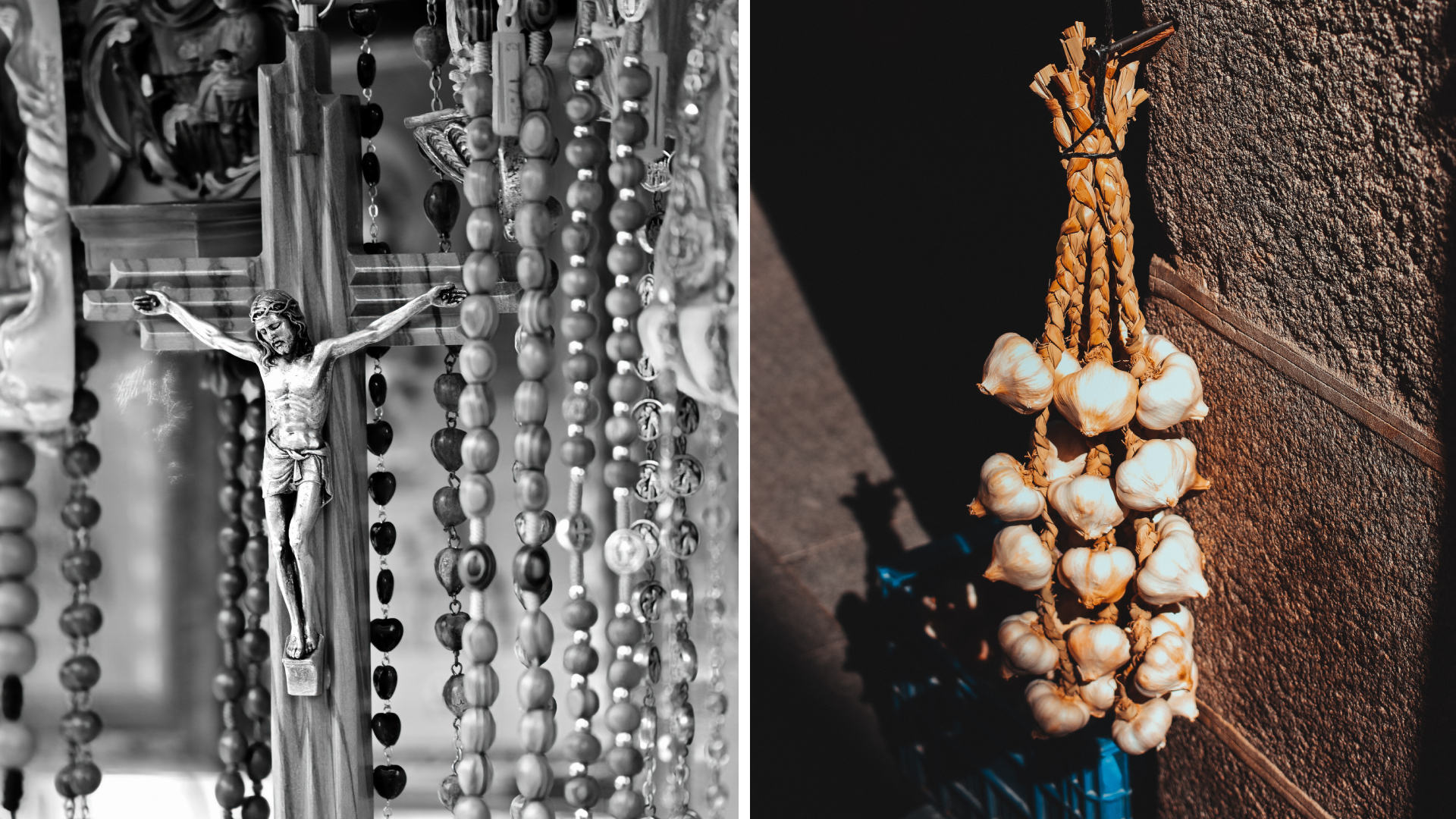
Image adapted from: RON ROV via Pexels, Ramón Salinero via Unsplash
As established, Filipinos can be both religious and superstitious, especially elders. In this case, rosaries and garlic go hand in hand for protection against evil entities and negative energies. Hanging them by the entrances or windows is the most common practice.
You’ll often see this in provincial towns compared to the city as town folk are more likely to rely on prayer and superstition.
This belief is also done to repel mythical creatures such as tiyanak (vampiric creature with a baby’s body) and tik-tik (shape shifting creature with an elongated tongue).
15. Offering food to spirits to keep them out of your home
 Image credit: Alfredo Evangelista via Fil-Am Voice
Image credit: Alfredo Evangelista via Fil-Am Voice
Normally, leaving food of any sort is done when visiting cemeteries, where loved ones are buried. Elders say that leaving food by the gravestone will keep the deceased loved ones remain satisfied.

Image credit: Faris Mohammed via Unsplash
For some reason, leaving food for wandering and unseen spirits also holds the same sentiment. In this case, the food is used as a barrier to keep the spirits from inhabiting one’s home. The common practice is to get a bowl of rice and leave it on the table or floor, which ensures your safety.
However, there’s a much darker tale indicating that you must make sure that the amount of food you leave is sufficient. Otherwise, the spirits will come for you anyway and inhabit your home.
16. Putting money in shoes for wealth

Image credit: Flexi
Putting money, usually a coin, inside your shoes is a superstition reserved for special occasions or gatherings. Elders say that by doing this, especially when the shoes are brand new, you’re likely to attract prosperity and wealth.
Sometimes, this is also done when you’re feeling nervous. Some believe that putting a coin in your right shoe will bring you luck and good fortune, which, even just the thought of it, will eventually make you calm down and feel more self-confident.
17. Trimming nails at night will cause accidents
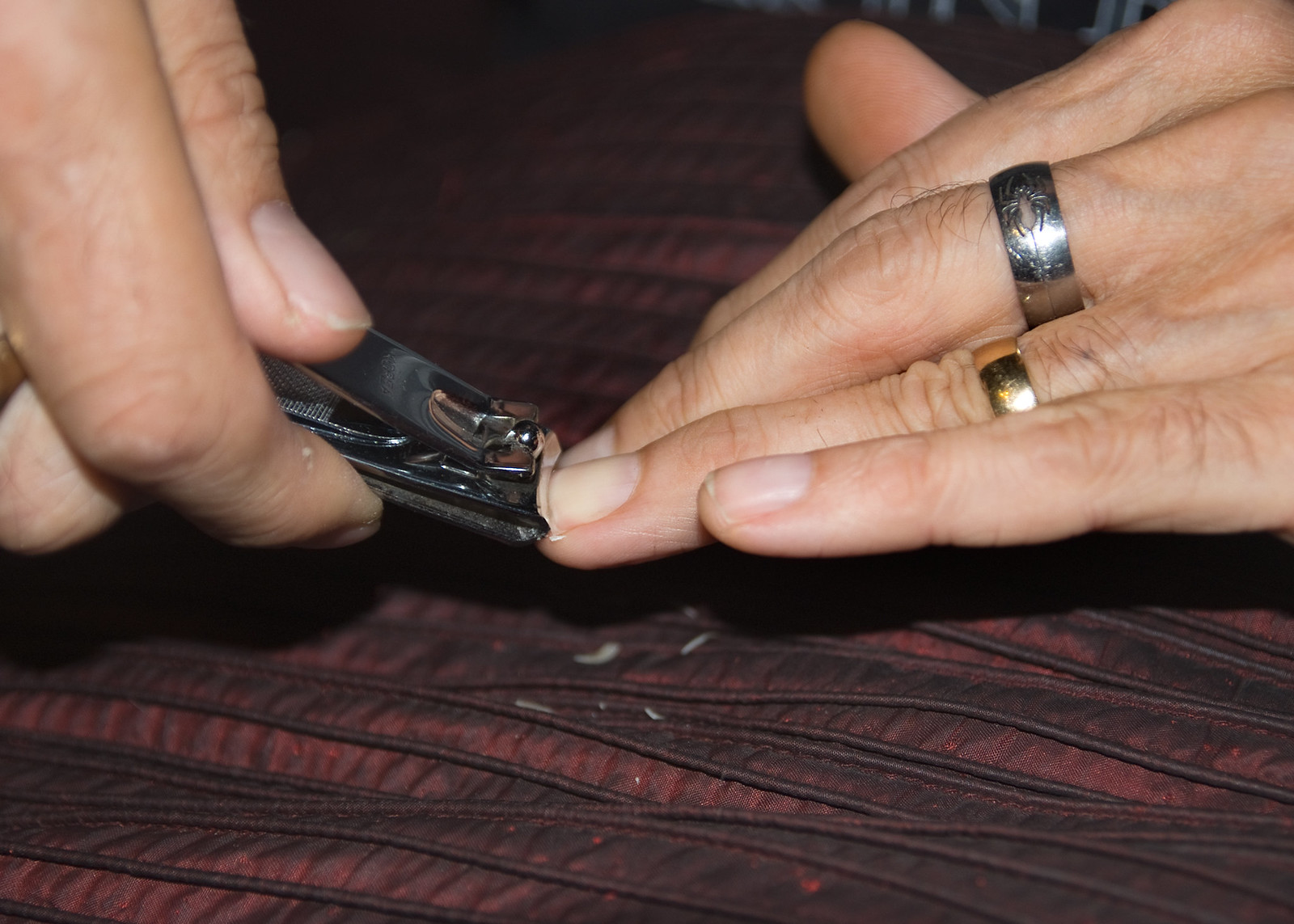 Image credit: An Old Barbie Doll via Flickr
Image credit: An Old Barbie Doll via Flickr
Apart from chores, even grooming rituals pose a superstitious threat to Filipinos. Trimming your nails at night is prohibited by elders to avoid accidents and misfortunes from happening.
Usually if they catch you doing this, they will stop you even when you’re in the middle of it. Sometimes, if you ask why, they’ll simply say, “basta” (just because/ it just is). This is probably because they don’t believe in the superstition.
But just to be on the safe side, most elders will tell you to avoid cutting your nails at night.
18. Turning your plate when someone leaves the table to ensure safety

Image credit: Food Philippines
Filipinos are quite hospitable when having someone over for a meal. That’s why it’s only natural that even in this, there are beliefs that must be maintained.
In this case, if the person visiting is done and ready to leave the table, you and the others must rotate or turn your plates to ensure that the person leaving is safe on the way home or to their next destination.
Related to this superstition, another suggests that the table shouldn’t be cleared until everyone is done eating. Otherwise, the last person eating will potentially live a lonely life or never get married.
19. “Tao po” to stay safe from mythical creatures
As of this day, many people use the expression “tao po?” (anyone there?) as a question, calling for someone from the inside. However, history suggests otherwise. Filipinos back then made sure to stay safe against mythical creatures, which were said to be not-so-mythical.
In the past, you say “tao po” as a statement to confirm that you’re human and not a supernatural creature that can mean harm to the people inside. This goes hand in hand with hanging up garlic by the door and shutting the windows closed at night, so as to avoid tempting the creatures to approach your home.
20. Sukob between siblings for undivided luck

Filipino horror film “Sukob”
Image credit: Sinepanghalina via Facebook
Weddings are no easy task. They take months, and sometimes even years, to plan a “perfect wedding”. Double weddings, on the other hand, pose a different story. Yes, the prospect of it can be fun as each couple won’t be alone in experiencing wedding jitters and you can bounce ideas off each other.
But Filipino elders would have you believe differently, especially if it involves your siblings. This refers to sukob, a superstition that bars sibling from getting married in the same year. If this happens, luck and good fortune will be divided between the two marriages.
Even more so, it’s believed that ignoring the superstition will lead to bad luck and death upon an immediate family member. Because of its dark interpretation, this superstition is widely practiced among Filipinos till today.
21. Respecting elementals is a must

Image adapted from: Midnight Archives, Midnight Archives via Facebook
Filipino folklore tells us tales about many mythical creatures from kapre (tobacco-smoking giant) to nuno sa punso (old dwarf guarding nature i.e. dirt mounds and trees). Most of them are believed to be living in nature, so think forests, mountains, caves, and more.
Unknown to us, we may be stepping into their territories when going on hikes or exploring the woods. This is why it’s customary to say “tabi tabi po” (excuse me/ pardon me) as a form of respect to these elementals. Forgetting to say this out loud might offend them and as a consequence, you’ll end up with an illness that only an albularyo (folk healer) can cure.
Even though it may sound amusing, travelers tend to say the expression to avoid sickness overall.
22. Suddenly missing things because of dwarves
Most of us get reprimanded by parents when we can’t find missing things. And usually, it’s because we just forgot where we put it. But if for some reason, that something goes missing all of a sudden, elders believe that it could be caused by a mischievous duwende (dwarf).
While they say that there are dangerous duwendes with bad intentions, there are also harmless ones such as these, who like to play and hide your things until you find them.
Sometimes, things go missing for so long that it takes more than one person to look for it. If you’re with an elder, it’ll make sense why they say “ay, pinaglalaruan tayo” (oh, we’re being played with).
Filipino superstitions in everyday life
It’s true. Superstitions have no logical validations. However, we should remember that they’re deeply ingrained in Filipino culture and continue to be interpreted in more ways than one.
While some people take them very seriously, others may simply enjoy following these customs for cultural or traditional reasons.
To learn more about Filipino culture, check out our lists of Filipino funeral superstitions, Tagalog slang words & phrases, and Filipino comedy shows & films. For more reads like this, visit The Smart Local Philippines.
Cover image adapted from: The Aswang Project, Kyla Worrell and Mya Worrell via Pacific Ties, @michaelramstead via Twitter, Flexi

